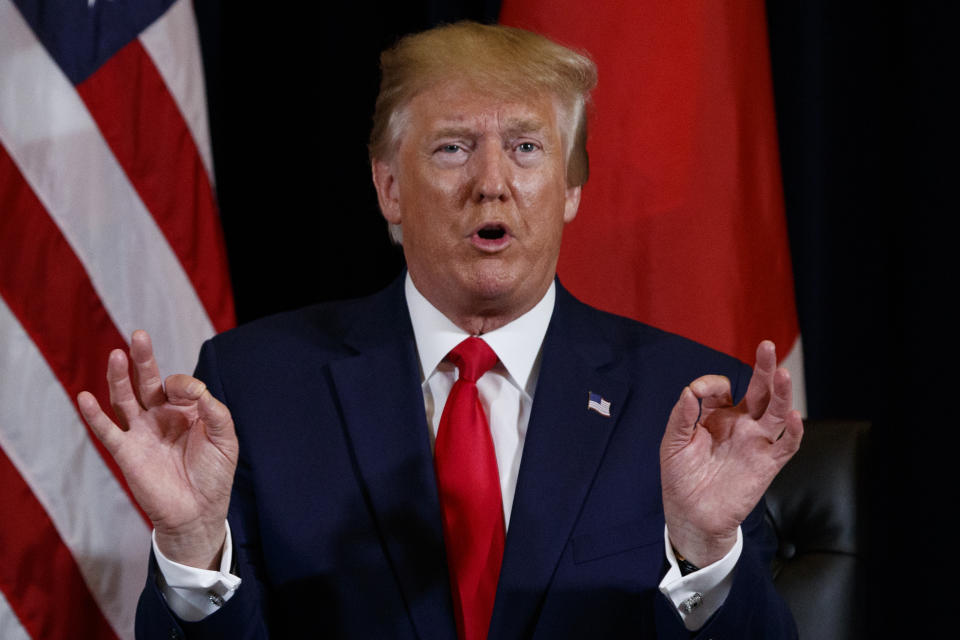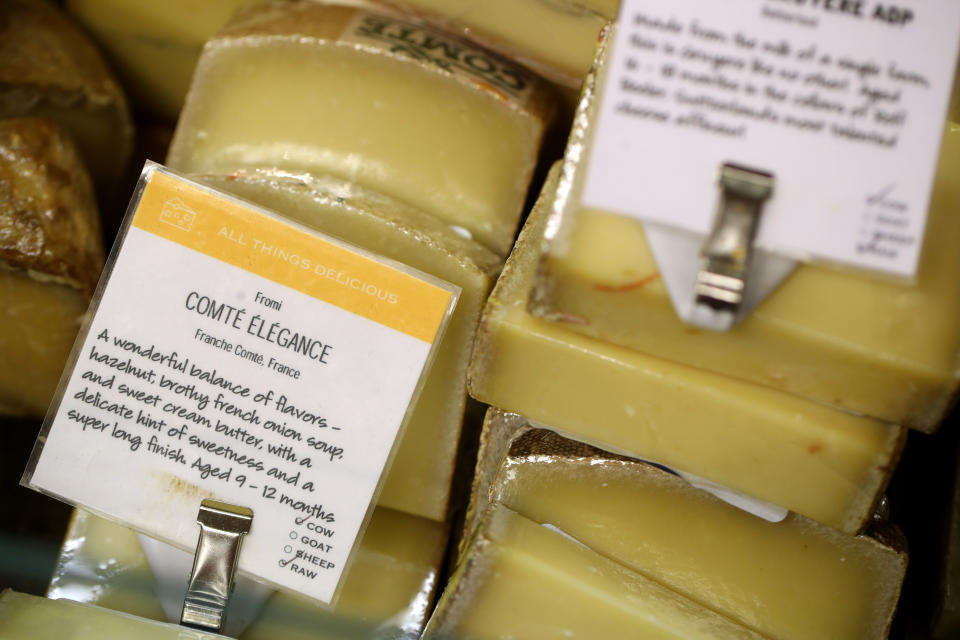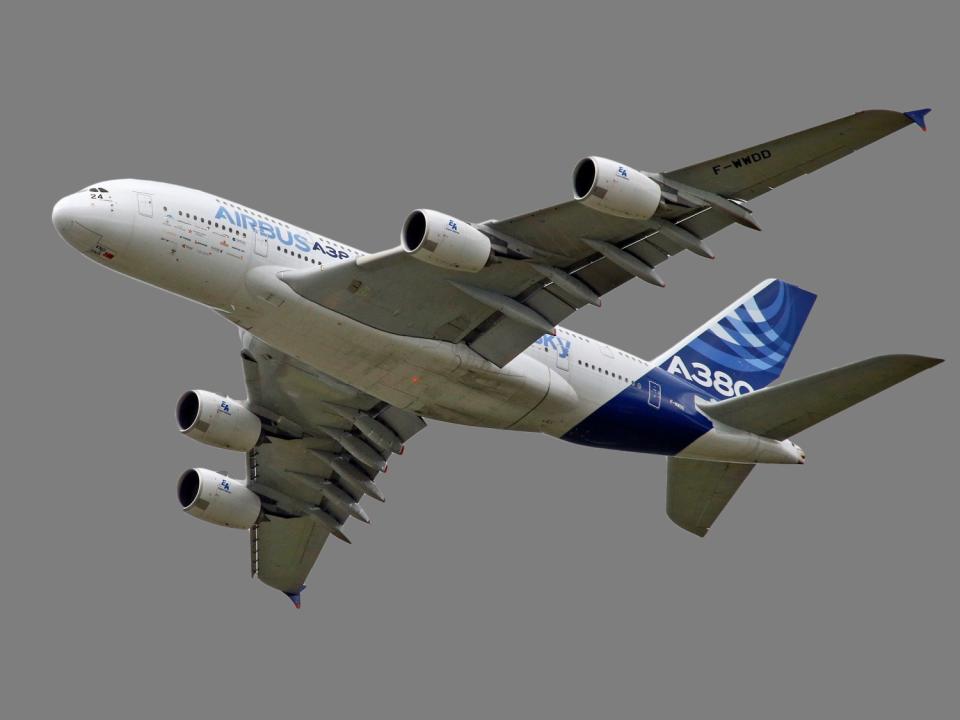Trump's tariffs might make your cheese more expensive
President Trump is threatening America’s love affair with cheese. The trade war with China has already rattled Americans. Consumer confidence fell to its lowest level in nine months in September. The opening of an official impeachment inquiry by House Speaker Nancy Pelosi on Tuesday is doing little to calm nerves either.
Those seeking out cheese platters or stringy delicious goodness on pizza to cope, may lose that comfort food, too.
The American cheese industry is bracing for costs from additional tariffs next month after the recent World Trade Organization ruling in favor of Trump’s bid to impose tariffs on European products. The move is meant to offset subsidies to European aerospace giant Airbus which Boeing has referred to as illegal. “The EU has taken advantage of the U.S. on trade for many years. It will soon stop!” Trump said in April.

The WTO will make its official ruling public next week, but has already authorized the U.S. to impose tariffs on nearly $8 billion of European products.
The U.S. Trade Representative’s office hasn’t yet officially announced which goods will be impacted, but it has proposed placing tariffs on planes, wine, leather goods and other European imports. The EU is likely to hit back with its own set of retaliatory tariffs.
Cheese has also landed in the crosshairs of Trump’s dispute with the European Union.
The top-selling cheeses that could be impacted include Pecorino Romano, Parmigiano Reggiano from Italy, French Brie, and Gouda from the Netherlands. The cost of doing business in the cheese industry would double should Trump choose to impose the additional 100% tariff. The added tariff would cost importers $1 billion annually, according to the Cheese Importers Association of America, a trade group.

$40 per pound
Most specialty cheese from Europe costs between $10 to $19 a pound. If U.S. importers couldn’t afford to absorb the higher cost of tariffs, they might decide to pass them onto consumers. The Cheese Importers Association of America estimates that European cheese prices would increase to $20 to $40 per pound. Importers fear that consumers might balk at those prices.
The $1 billion of cheese imports the USTR is targeting for tariffs generates over $3.5 billion in revenue for U.S. businesses, like trucking companies, importers, supermarkets, and restaurants. Higher tariffs eat into margins and would result in the loss of over 20,000 jobs, according to the Cheese Importers Association of America.
Airplane subsidies
How cheese and other food products like wine and olive oil became Trump targets continues to stump importers who say those food items have nothing to do with the airplane dispute Trump wants to punish Europe for.
“Why bring in all these other types of products and everything else when it has nothing to do with the aerospace industry. If you have a problem with regard to agriculture and the United States wants more access to Europe, that’s a separate issue. Don’t affect people that have been in business for years,” says Phil Marfuggi, president of the Cheese Importers Association of America.

(The U.S.’s fight with Europe over airplane subsidies has been going on for 15 years. The U.S. has accused the EU of providing subsidies to Airbus in order to help the company gain market share over Boeing. The EU, on the other hand, has accused the U.S. of providing tax breaks to Boeing.)
Like ‘playing Russian roulette’
“As a businessman trying to manage a business…it’s like we’re playing Russian roulette here,” says Thomas Gellert, president of Atalanta, a cheese importer. “We think it’s highly unfair that the government would choose to tax food out of a dispute of airlines. To ask consumers to pay additional 100% tariffs would make many of these products unmarketable.”
Atalanta, which has more than 600 employees, works with grocery chains such as Walmart, Kroger, Costco, and Trader Joe’s. The company just completed a $12 million investment in their cheese conversion plant in New Jersey. But Gellert says the uncertainty has been bad for business and as a result, the company has had to put some investments on hold.
“If you think of a charcuterie board which has a great selection of cheeses, maybe some jams, some olives. If you go to a retailer…say it’s $45. I don’t think the consumer is going to start paying $90 to $100 for that,” Gellert says. “Here we’re going into the holiday season and people want to entertain. It’s definitely daunting.”
More from Sibile:
How Trump’s tariffs are hurting swing states
Here’s what happens when your privacy is violated on social media
Democratic debate: Trump trade war treating workers like ‘poker chips’ in ‘his bankrupt casinos’
Why a Trump tax cut is no longer a winning campaign strategy
Trump’s stimulus hopes may get frustrated by Congress, 2020 politics

